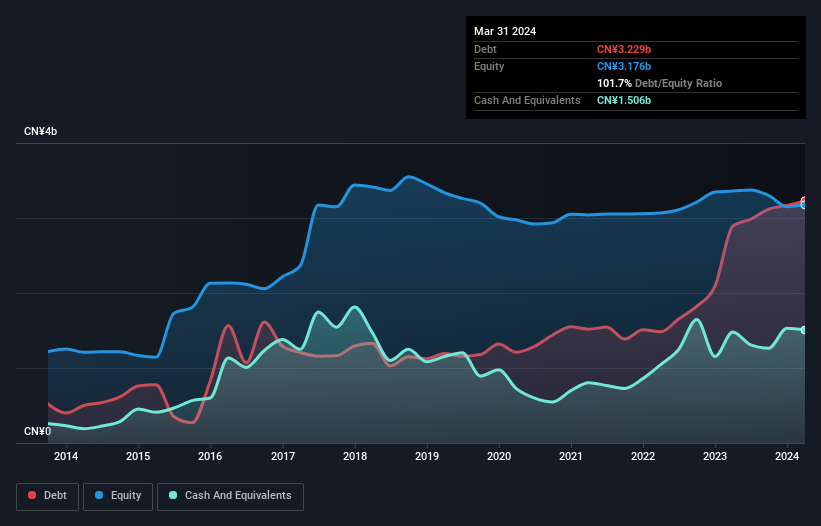
Howard Marks put it nicely when he said that, rather than worrying about share price volatility, 'The possibility of permanent loss is the risk I worry about... and every practical investor I know worries about.' So it might be obvious that you need to consider debt, when you think about how risky any given stock is, because too much debt can sink a company. We note that Hunan Corun New Energy Co., Ltd. (SHSE:600478) does have debt on its balance sheet. But the real question is whether this debt is making the company risky.
Why Does Debt Bring Risk?
Debt is a tool to help businesses grow, but if a business is incapable of paying off its lenders, then it exists at their mercy. Part and parcel of capitalism is the process of 'creative destruction' where failed businesses are mercilessly liquidated by their bankers. However, a more frequent (but still costly) occurrence is where a company must issue shares at bargain-basement prices, permanently diluting shareholders, just to shore up its balance sheet. Of course, plenty of companies use debt to fund growth, without any negative consequences. The first thing to do when considering how much debt a business uses is to look at its cash and debt together.
See our latest analysis for Hunan Corun New Energy
What Is Hunan Corun New Energy's Net Debt?
You can click the graphic below for the historical numbers, but it shows that as of March 2024 Hunan Corun New Energy had CN¥3.23b of debt, an increase on CN¥2.89b, over one year. On the flip side, it has CN¥1.51b in cash leading to net debt of about CN¥1.72b.

How Healthy Is Hunan Corun New Energy's Balance Sheet?
The latest balance sheet data shows that Hunan Corun New Energy had liabilities of CN¥3.81b due within a year, and liabilities of CN¥2.07b falling due after that. Offsetting this, it had CN¥1.51b in cash and CN¥670.3m in receivables that were due within 12 months. So its liabilities outweigh the sum of its cash and (near-term) receivables by CN¥3.71b.
This deficit is considerable relative to its market capitalization of CN¥5.45b, so it does suggest shareholders should keep an eye on Hunan Corun New Energy's use of debt. Should its lenders demand that it shore up the balance sheet, shareholders would likely face severe dilution. When analysing debt levels, the balance sheet is the obvious place to start. But it is Hunan Corun New Energy's earnings that will influence how the balance sheet holds up in the future. So if you're keen to discover more about its earnings, it might be worth checking out this graph of its long term earnings trend.
In the last year Hunan Corun New Energy had a loss before interest and tax, and actually shrunk its revenue by 16%, to CN¥3.5b. That's not what we would hope to see.
Caveat Emptor
Not only did Hunan Corun New Energy's revenue slip over the last twelve months, but it also produced negative earnings before interest and tax (EBIT). To be specific the EBIT loss came in at CN¥29m. Considering that alongside the liabilities mentioned above does not give us much confidence that company should be using so much debt. So we think its balance sheet is a little strained, though not beyond repair. However, it doesn't help that it burned through CN¥168m of cash over the last year. So to be blunt we think it is risky. When we look at a riskier company, we like to check how their profits (or losses) are trending over time. Today, we're providing readers this interactive graph showing how Hunan Corun New Energy's profit, revenue, and operating cashflow have changed over the last few years.
If you're interested in investing in businesses that can grow profits without the burden of debt, then check out this free list of growing businesses that have net cash on the balance sheet.
Valuation is complex, but we're here to simplify it.
Discover if Hunan Corun New Energy might be undervalued or overvalued with our detailed analysis, featuring fair value estimates, potential risks, dividends, insider trades, and its financial condition.
Access Free AnalysisHave feedback on this article? Concerned about the content? Get in touch with us directly. Alternatively, email editorial-team (at) simplywallst.com.
This article by Simply Wall St is general in nature. We provide commentary based on historical data and analyst forecasts only using an unbiased methodology and our articles are not intended to be financial advice. It does not constitute a recommendation to buy or sell any stock, and does not take account of your objectives, or your financial situation. We aim to bring you long-term focused analysis driven by fundamental data. Note that our analysis may not factor in the latest price-sensitive company announcements or qualitative material. Simply Wall St has no position in any stocks mentioned.
About SHSE:600478
Slightly overvalued with questionable track record.
Market Insights
Community Narratives




